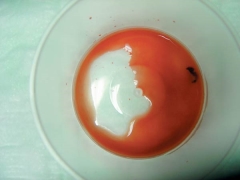Blood in the urine of a child
As soon as parents notice an admixture of blood in the children's urine, they immediately turn to a pediatrician or urologist. Such a condition is usually a reason for immediate consultation with a doctor, since the appearance of blood can be a sign of serious diseases.
The reasons
Most often, the detection of blood in a child's urine indicates kidney disease, but extrarenal causes may also lead to hematuria. Blood may appear when:
- Hereditary diseases of the urinary tract.
- Infectious lesions of the excretory system.
- Renal failure.
- The deposition of salts and stones in the kidney or bladder.
- Glomerulonephritis.
- Damage to the urinary tract.
- Problems with blood clotting.
- Reduced immunity in viral infections and colds.
- Problems with the blood supply of the kidneys, in particular, with kidney thrombosis of the kidneys.
- Systemic diseases.
- Tumor processes.
Have a newborn
Often parents mistaken for blood redness of urine of a newborn baby, which normally happens in the first days of a baby's life due to an excess amount of urats. This condition is called uric acid infarction and is not a sign of illness of the baby.
However, blood may indeed enter the urine of a newborn baby, for example, in birth trauma, congenital renal pathologies, or infection of the urinary tract of the crumbs.
Have baby
In the first year of life, the vessels in the baby’s body are still very fragile, so any health problems can cause damage to them. Even a cold with a high fever or heavy physical exertion can cause urination with blood.
Due to improper care of the baby, a urinary tract infection may develop, for example, an infant may develop cystitis or urethritis.
In addition, hematuria detected in infancy may indicate congenital abnormalities, the development of glomerulonephritis or hemorrhagic diathesis.
In older children
Urination with an admixture of blood in older children often indicates a disease of the kidneys or bladder. This is a common symptom of cystitis or nephritis.
Blood can also appear when a stone forms in the urinary tract - it can damage the mucous membranes and cause bleeding. Frequent in older children and bleeding from the urinary tract caused by injuries.
Diagnostics
A large number of erythrocytes in the urine changes the color of urine (it becomes red) and is called gross hematuria. Her parents notice visually and immediately seek medical help. However, a child may have another condition called microhematuria, when blood enters the urine, but outwardly it is imperceptible. Such a problem can be identified only in laboratory studies of urine.
If there are suspicions of blood in the urine of a baby, it is important to pass general urine analysis, and Kakovsky-Addis samples and Nechiporenko. Also, the child will be assigned to ultrasound and blood tests. In some cases, the doctor sends the baby on tomography, cystoscopy or x-rays.
If blood appears when the baby begins to urinate, then problems with the urethra are the cause. If the discharge of blood is noted at the end of urination, this happens with bladder lesions.
Additional detection in the urine protein analysis confirms kidney damage.If there are blood clots in the urine, it is also characteristic of kidney disease, but can also be observed when bleeding from other parts of the excretory system.

What to do?
The first thing that is important to do for parents who notice blood in children's urine is to make sure that the urine actually includes blood cells. First you need to remember whether the child had eaten any products with red pigments (beets, blueberries, sweets and others) the day before, and also if he had started taking any new medicines. If so, make sure that the child drank enough, and very soon the urine will turn yellow again.
If the connection with drugs and products is not found, you should go to the doctor. The specialist will prescribe a urine test, as well as a blood test of the child, which will allow to identify the cause of the problem and start its elimination in a timely manner.
Reasons why you should not worry about the presence of traces of blood in the urine
Excretion of blood in the urine is considered acceptable if:
- A catheter is inserted into the urethra of a child. The appearance of blood is possible and several days after its extraction.
- The child held cystoscopy. Blood can be released on the day of the procedure and several days after it.
- The procedure was performed crushing or removing stones from the kidneys.
- On the eve of the analysis, the child had very intense physical exertion.











